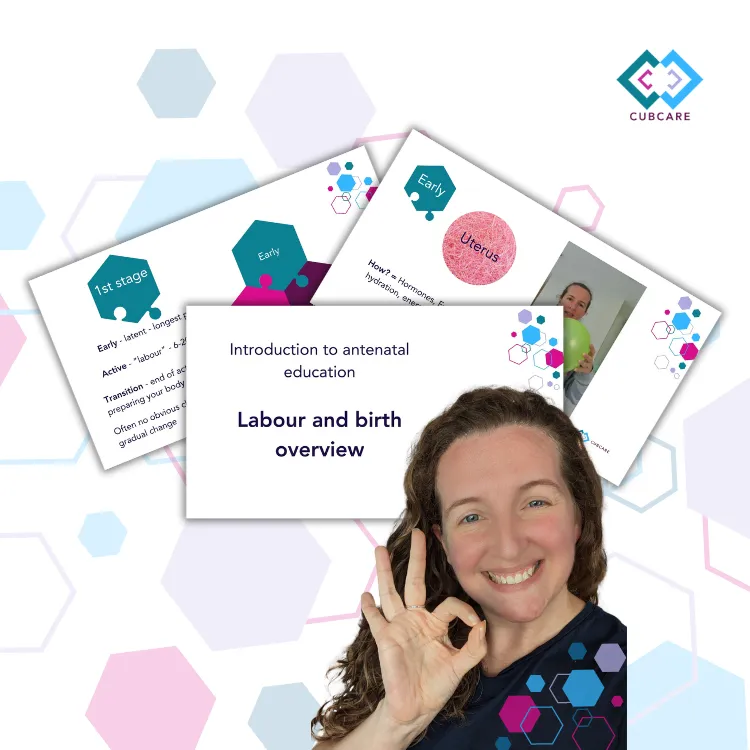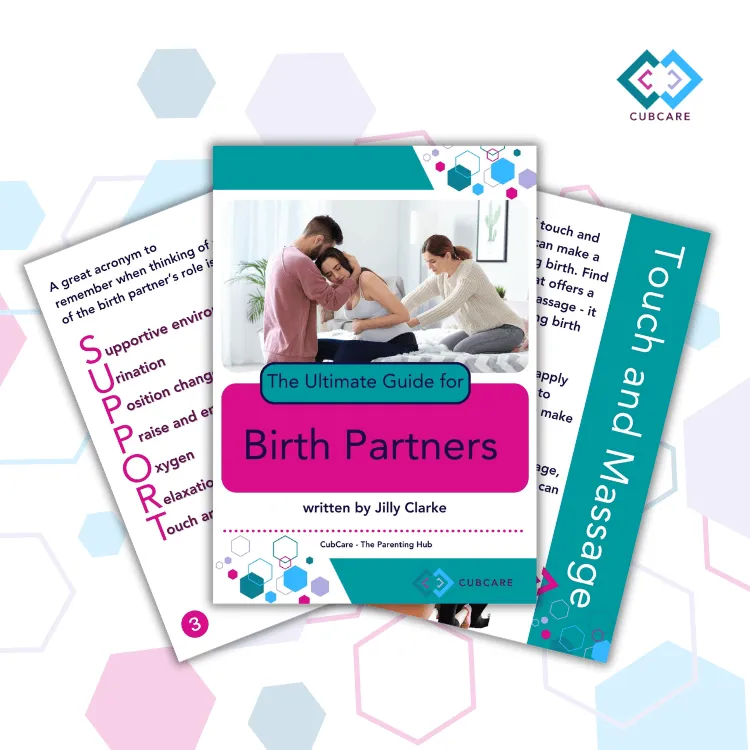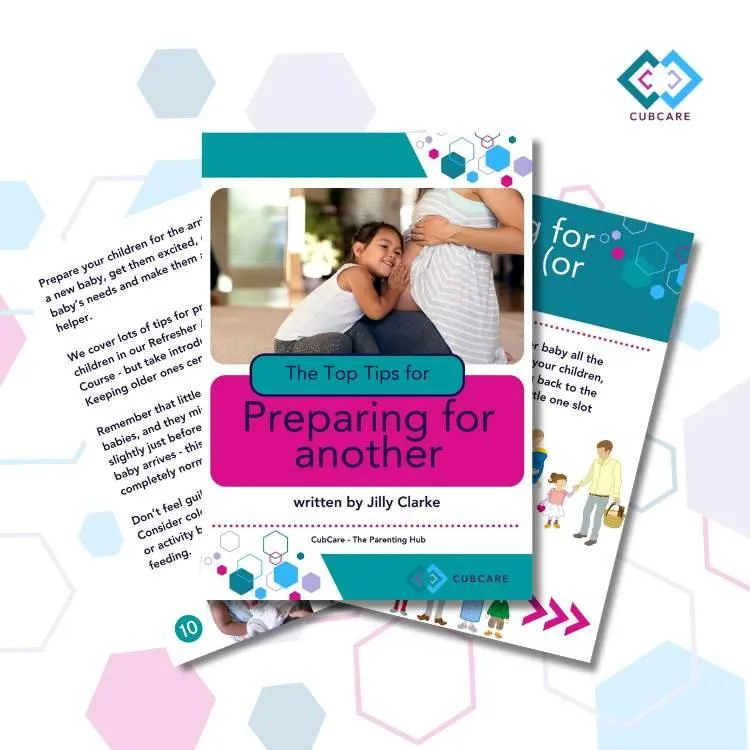We're an award winning Antenatal and Postnatal Education Platform 2025!
(read more here)
CubCare blogs.
From early pregnancy to newborn development.
Advice to help through pregnancy, birth and childhood.
BLOG

Baby Sleep development
"THIS is what sleeping through means - a stretch of 5 hours of sleep. Sleeping through a feed. NOT getting 10-12 hours of sleep without a wake-up! Although this is a dream of all sleep deprived new parents, it isn't a realistic goal for a lot of families, for a good while." - Jilly Clarke
Baby sleep - how to get a newborn to sleep better?
Baby sleep is hottest topic at our CubCare Baby Classes. Besides their bowel habits…!
It can often be a source of concern for new parents. We need to remember that small babies wake when they are hungry and sleep when they are full. It is also important to remember that sleep is a developmental process. All babies will develop at their own rate, in their own way, in their own time.
Please do not stress if (when) your baby is doing something completely different to another. They are all individual with different sleep and feeding needs.
If you’d like to learn more about developing baby’s sleep then our Baby Sleep online course gives you all the information for understanding baby's sleep and the science behind it all. Knowing the biology can help you to get more restful nights.
Baby sleep biology
Human babies are biologically evolved to sleep near to their mother’s body during the first months and years of life. In the past, we could not have survived without doing so.
So therefore, it is biologically normal, at least in the first few weeks of life for baby to only be happy settling on, or near to a parent. If we think about the fourth trimester and the huge brain development that is going on for baby during this time you can imagine that it would be quite unsettling for a little one. The world is so different from the womb. They need parental support. They need it 24 hours a day.

Baby's circadian rhythm
Circadian rhythms will always come up as important when thinking about baby sleep. Circadian rhythms are physical, mental, and behavioural rhythms or changes that follow a 24-hour cycle. These natural processes respond primarily to light and dark, but also to hormonal regulation. This is sometimes called your body clock.
Circadian rhythms do not start to emerge until baby is around 8 weeks. Until then, the pattern they formed in the womb, generally taken from your routine, is what they'll stay with. So usually they'd be sleepy during the day when you would have been more active, and more awake in the evening. Small babies are genetically wired to be awake more at night for a variety of reasons (availability of a food source and nature's way of making sure that milk producing hormones are at their highest overnight).
But there are several things you can do to encourage this circadian rhythm to emerge and remain in sync. At first it might seem fruitless, but following a general pattern of events can help to set up a healthy circadian rhythm.
Sleep hygiene and circadian rhythms
Establishing good sleep hygiene from the start can make your life easier in the long run. These tips are particularly helpful when initially laying the foundations of sleep in a newborn, after a holiday or a time change, after a period of unsettledness (illness, teething, developmental leap).
These 5 simple things can help to get everybody more predictable sleep patterns.
Exposure to daylight – particularly in the morning.
Naps in the light – this works alongside the hormonal aspect of sleep and can be important in setting sleep rhythms. Past 3 months of age it gets more complex with distractions…! So from then on a dimly lit room might work better.
Have a predictable wake time in the morning
Normal noise and activity levels during day sleeps for the first couple of months
Keeping environment darker and quieter at night
Newborn sleep needs
Newborn babies may sleep up to 18hrs a day at first but only in 1.5-3hr blocks initially. This is just an average though, there are some babies with high sleep needs and others with less sleep requirements. Also, their tummies are tiny and will need filling often, hence they wake, or ask for food often.
When they are small, the general rule to live by is if they are stirring, give them a feed. They will either go back to sleep afterwards or wake for some play time. As they grow, their sleep pressure (that builds the longer they have been awake, essentially forcing sleep) takes a little longer to build. They can tolerate more awake time.
Baby sleep needs - 2 months plus
As baby grows, from around 2 months their circadian rhythm starts to emerge, and their sleep will slowly start to consolidate into a longer block at night. This likely creates more periods of awake time during the day. But it is common for babies to wake regularly in the night until age 1, and even completely normal way beyond that too.
When thinking of implementing some sort of routine for your baby (and by routine, I mean a regular pattern of daily activities, not a strict feed, play, sleep pattern), before the two-month mark often everything is a little too unpredictable.
When the evening cluster feeding has settled, you can sense when baby is getting a regular bedtime. At this point bringing a pattern of activities or events as you wind them down for bed creates that sense of familiarity.
It might be that baby is not ready for a stretch of sleep until 10 or 11pm. That is perfect if that works for you. Often you can then get a stretch of sleep at the same time, when if they go to bed at 7pm their longer stretch of sleep happens when you are awake!
If you’d like to learn more about developing baby’s sleep then our Baby Sleep online course gives you all the information for understanding baby's sleep and the science behind it all. Knowing the biology can help you to get more restful nights.
When will my baby sleep through the night?
In our Baby Sleep online course we talk about when babies might be “sleeping through” the night. We emphasise the importance of having those realistic expectations in our mind. It can help us through the difficult times to know that baby is acting completely normally!
By the time babies are 3 months old some (but by no means all) begin to start sleeping through and potentially missing a night-time feed. This results in sleeping a stretch of up to 5 hours at a time.
THIS is what sleeping through means - a stretch of 5 hours of sleep. Sleeping through a feed. NOT getting 10-12 hours of sleep without a wake-up! Although this is a dream of all sleep deprived new parents, it isn't a realistic goal for a lot of families, for a good while. A better goal might be to all get as much rest as possible.
By the time they are 5 months old half of babies may have started to sleep for an eight-hour stretch on some nights. Notice the word “some” – there are so many reasons why baby might wake and need help or reassurance. It could be they are too cold, hot, uncomfortable; their dummy fell out and they cannot find it, a breeze, an itchy foot… The list is endless as to the reasons they might wake, and as the trusted adult they often need your help.
Baby's personality might make it hard for them to sleep through the night
There are two types of sleepers.
Generally, babies do not sleep all night-every night, regularly, until they are close to a year old. One study investigating infant sleep duration found that 27% of babies had not regularly slept from 10pm to 6am by the age of 1 year. That is almost 1/3 of small humans waking frequently by age one. That is incredibly common! We also know that around 13% of babies had not regularly slept through for 5 hours or more by the age of 1 year. That is around one in seven babies; considering that our baby classes hold around 9 babies that is at least one in every class
The key thing to understand is that baby’s sleep cycles are approximately half the length of an adults, at around 45-50 min. So, if something is bothering them when they enter their light stage of sleep (hunger, cold, hot, uncomfortable etc.) then they are more easily disturbed – and that means they could potentially be disturbed more than an adult might be.
It is also worth understanding whether your baby is a ‘self-soother’ or a ‘signaller’ i.e. do they wake in the night and largely get back to sleep with little adult input. Or do they require adult help and support settling back to sleep after every wake? Knowing which temperament your baby has can help your understanding of them and can make dealing with night-time parenting a little easier. Up to 80% of babies needed some help to get to sleep according to a 2021 study. So it really is very common!
We go into the science and break down some important topics to help you understand baby sleep from the evidence, in our Baby Sleep online course. At only £21, this is a bargain for your sleep sanity!
We run baby classes that are perfectly designed to help you understand baby's sleep and wider development - and get support from others going through it. Currently running in Welwyn Hatfield, Hertfordshire.
Baby Classes in person, in Welwyn Hatfield
We also offer a range of baby development and parenting workshops that are completely on-demand, online.
Baby Sleep Course online
Easily navigate to our most popular Blog categories
Download our Freebies

Labour and Birth
Watch our introduction to antenatal education webinar, our labour and birth overview - to start your antenatal education journey. Understanding the process, and what you can do to influence it.

Pregnancy Planner
Free Pregnancy Planner to help you prepare for a little one. Prepare your body, your mind, your finances and your home. Get organised, feel good and prepare for an active, positive birth.

Birth Partner Guide
Your ultimate guide to being the best birth partner during pregnancy, birth and recovery. Learn what you need to do, and what you need to learn to be the best birth partner possible.

Expecting Again Guide
Your ultimate guide to preparing for another birth and an extra baby. Our top tips for navigating pregnancy and birth, and helping your older ones to transition into their new role as a big sibling.
Based in Welwyn Hatfield, offering local pregnancy support and doula services across Hertfordshire: St Albans, Hatfield, Welwyn Garden City, Potters Bar, Stevenage, Harpenden, Hitchin, Barnet, Mill Hill and surrounding areas.
Online antenatal and postnatal education available UK-wide.
© Copyright 2025 CubCare The Parenting Hub. CubCare is operated by The Birth and Baby Company Ltd. Company No. 15655287
Privacy Policy | Terms & Conditions | Medical Disclaimer | Inclusivity and Accessibility

